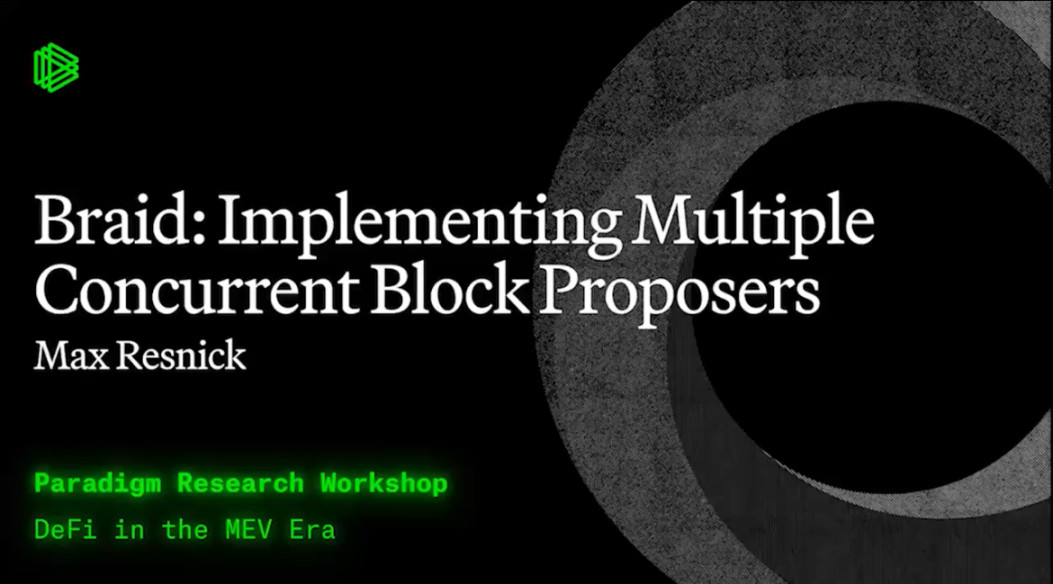Original article: Nicky, Foresight News
Amid the rapid development of blockchain technology, an increasingly prominent issue is how to achieve effective anti-censorship in an environment that relies on consensus mechanisms. Traditional blockchains are mostly driven by leaders, which gives leaders too much power over transaction selection and sorting, leading to potential censorship risks. This risk not only threatens the transparency and fairness of blockchain, but also limits its widespread application as a decentralized platform. It is against this background that Braid was born to solve the anti-censorship problem in Ethereum.
Censorship resistance is of great significance to the healthy development and widespread application of blockchain technology. First, it is the cornerstone of ensuring the transparency and fairness of blockchain. The immutability and transparency of blockchain are its core values, and censorship is a direct threat to this value. Second, censorship resistance is also a manifestation of the decentralized nature of blockchain. By achieving censorship resistance, Ethereum can truly become a decentralized network platform that is not controlled by a single entity, providing support for more users and applications.
Braid aims to build an Ethereum system that is resistant to censorship. It is currently in its early stages, but has already demonstrated its unique design ideas and technical potential. The core concept of Braid is to break the monopoly control of Ethereum by a single leader through technical means such as multi-block parallel and synchronous release, thereby ensuring the free flow of transactions and the fairness of the Ethereum network.
The design principles of Braid mainly include key elements such as the multi-proposer model and synchronous release. The multi-proposer model increases the cost of transaction blocking by introducing multiple concurrent proposers, thereby improving Ethereums censorship resistance. Synchronous release ensures that all proposers act on the same information set at the same time, further enhancing the fairness and transparency of the system. In addition, Braid also adopts strategies such as delayed execution to allow multiple proposers to influence the transaction status, further ensuring the stability and reliability of the Ethereum network.
In comparison with existing solutions, Braid has shown its unique advantages. In the LMD-Ghost (Latest Message Driven Ghost) consensus mechanism with multiple proposers, it may be necessary to store high branching factor trees in the local view to solve the fork choice problem. Although the Mysticeti (Sui) solution is about to be put into production, it has certain limitations in elegantly managing the number of validators. Compared with solutions such as LMD-Ghost and Mysticeti (Sui), Braid not only achieves stronger censorship resistance, but also retains the transparency and fairness of Ethereum. At the same time, Braids design is more concise and efficient, reducing the difficulty and cost of implementation. These advantages make Braid a strong candidate for solving Ethereums censorship problem.
In the specific implementation, Braid adopts a multi-block parallel approach and uses the same consensus mechanism to ensure consistency and collaboration between these chains. By running multiple parallel blocks, Braid achieves decentralized and decentralized transaction processing, thereby effectively resisting censorship risks. At the same time, Braid has also developed a technical tool called finality device to complete the final processing of transactions. This tool ensures the finality and consistency of transactions by extracting the transaction consortium on all chains and reordering these transactions.
Compared with traditional blockchain designs, Braid has significant advantages. First, it achieves stronger anti-censorship capabilities and ensures the transparency and fairness of Ethereum. Second, Braids design is more concise and efficient, reducing the difficulty and cost of implementation. These advantages make Braid have broad application prospects in the future. For example, in areas such as auctions that require a high degree of transparency and fairness, Braid can be used as an ideal solution to provide support.
Ethereum founder Vitalik reposted Braids tweet: Its exciting to see such progress! The issue of block construction seems to be gradually approaching its bright prospects.
Indeed, every technological breakthrough and theoretical innovation is a solid step towards a more ideal and decentralized blockchain world. We expect that with the deepening of research and the iteration of technology, Ethereum will be able to overcome all challenges and lead the blockchain industry towards a more brilliant future.
This article is sourced from the internet: Ethereum Braid: Building a Censorship-Resistant Blockchain Future
Related: Understanding Chromia in one article: A data-centric Layer 1 platform
summary Chromia is a data-centric Layer 1 platform that aims to optimize and enable high-performance AI and gaming applications by horizontally scaling to handle parallel tasks. Chromia will launch its mainnet in early Q3 2024 and recently completed integration with AI-driven gaming studio Ultiverse. Applications built on Chromia will run as sidechains, and the Chromia database-centric approach is well suited for applications that require complex queries and indexing. Project Description As Ethereum鈥檚 gas fees continue to rise, various Layer 1 alternative solutions that aim to optimize scalability continue to emerge. Chromia uses relational databases to achieve efficient data storage and retrieval, which has become its differentiating competitive point. Just as Ethereum adopted a modular approach to address its shortcomings, the design space for Layer 1 alternatives has also expanded significantly.…








